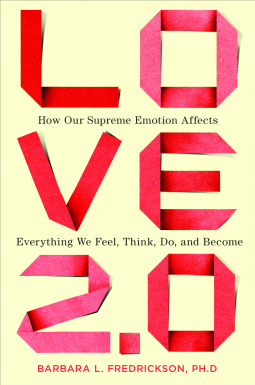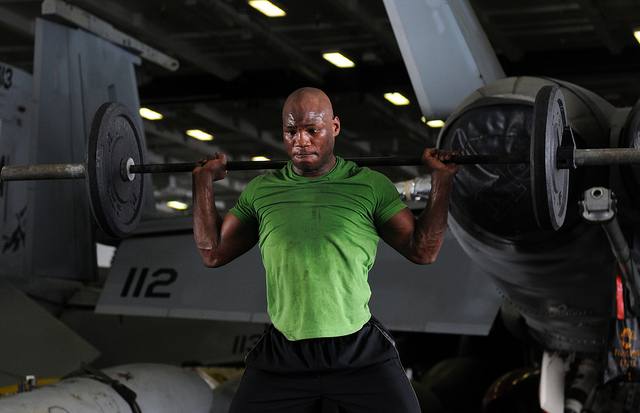
Since today is Valentine's Day, I thought you might enjoy some fun facts about love and positive psychology researcher, Barbara L. Fredrickson's new book,Love 2.0: How Our Supreme Emotion Affects Everything We Feel, Think, Do, and Become , is loaded with never-before-heard-of facts about love, romance, health and success. So pull up a chair, grab a loved one and have fun!
, is loaded with never-before-heard-of facts about love, romance, health and success. So pull up a chair, grab a loved one and have fun!
Okay first, this is science, so we need to define our terms. But rest assured, these are fun terms!
Barbara is the researcher most associated with the Positivity Ratio (Quick: go measure yours here. Then come right back for more cool stuff.) Basically, the Positivity Ratio says if your positive thoughts and feelings (a.k.a. positivity) out number your negative thoughts and feelings (a.k.a. negativity) by a ratio of at least 3 to 1, you'll likely flourish, rather than languish. The upward limit is around 11 to 1. Poliannas don't flourish.
Why do folks with strong Positivity Ratios thrive? Because, according to Fredrickson's research, positivity broadens your perspective so you notice more opportunities (Funny, Thomas Leonard said 15 years ago that's how Attraction works! I'd like to suggest that positivity is highly attractive). Positivity also helps you build resources such as, values, strengths and skills, that assist you even in tough times, which creates longer-term resiliency. That's her "Broaden and Build" theory.
Barbara has recently shifted her research to shared positivity, which she terms, "Positivity Resonance" or "Love 2.0". Love in the English language is an extremely broad term. To measure it, she had to define love very narrowly. Keep that in mind, while reading the fun facts about Love 2.0, below. Her definition for positivity resonance is limited to positivity that is shared by people face-to-face or in physical contact.
"Love is our supreme emotion that makes us come fully alive." - Barbara L. Fredrickson
Here are twenty-five fun facts about Love 2.0:
- "...love, and its absence, fundamentally alters the biochemicals in which your body is steeped."
- Love is a momentary state that can pass between strangers who share a mutually positive experience together.
- Love is a skill that can be learned which impacts the expression of your genes.
- "The sheer complexity of love's biology is reason enough for awe."
- When you learn to prioritize love, you actually get more value from it and become resilient faster.
- Love literally changes your mind and enables you to see others wholeheartedly, helping you transcend your usual ego perspective.
- Love is the arising of three events: shared positive emotions, sychrony between you and another's biochemistry and behavior, motive to invest in each other's well-being.
- Other positivity emotions are not mirrored back in this way.
- Love reverberates between people and belongs to all parties involved.
- Safety is a precondition for love.
- People who suffer from anxiety, depression, loneliness and low self-esteem; have a limited ability to experience love 2.0.
- Eye contact is a potent trigger for positivity resonance.
- You can experience some of the positive effects of love 2.0 while alone, when thinking about a loved one for instance, but the effects are diminished.
- Love impacts your body on the cellular, even molecular level.
- Love physically impacts your brain's development, causing you to experience more positivity and less anxiety.
- Love 2.0 triggers cascades or oxytocin, sometimes called, "the love hormone".
- Oxytocin is the lead chemical in the "calm and connect" function; it literally reduces stress.
- Oxytocin appears to make people more intuitive about others.
- Love increases "vagal tone", which your doctor can measure to predict the likelihood of your having a heart attack.
- People with higher vagal tone regulate glucose levels and inflammation, as common denominator in many diseases, including diabetes, heart disease and cancer.
- Vagal tone can be improved with training with positivity resonance.

- "In the very moment that you experience positivity resonance, your brain syncs up with the other person's brain."
- The effects of love can be carried to you by a person's voice.
- "Brain coupling" occurs between people who are experiencing positivity resonance and in some cases, you begin to anticipate the other person's thoughts, feelings and words, rather than just react to them.
- The causal arrow runs in both directions at once and drives self-sustaining trajectories of growth.
Well that's just 25 fun facts. I highly recommend you read the whole book, maybe with a loved one! Or just put some of these 25 facts to work in your life to enjoy greater health, resilience, flourishing, and love.











